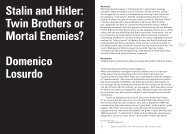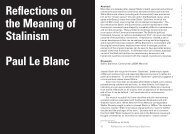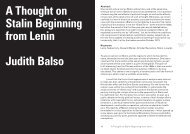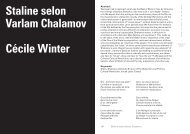adrian
adrian
adrian
- No tags were found...
You also want an ePaper? Increase the reach of your titles
YUMPU automatically turns print PDFs into web optimized ePapers that Google loves.
of surpassing as “post-” in the different sense of preserving; aproposboth the transcendental unity of apperception as well as transcendentalidealism überhaupt, Hegelian “speculation” (i.e., absolute idealism) is a“transformation (Verwandlung),” instead of a continuation, of Kantian“reflection” (i.e., subjective idealism).As the above passage from the Differenzschrift indicates, Hegel’sinterpretation of the “Transcendental Deduction” is very much alongthe lines of (albeit avant la lettre) the Allisonian “reciprocity thesis”reading—and this insofar as an equivalence can be maintained betweenHegel’s “identity of subject and object (die Identität des Subjekts undObjekts)” and Allison’s “reciprocity” between apperceiving subjectivityand apperceived objectivity. This reciprocity thesis, as subject-objectidentity, is the Critique of Pure Reason’s “purely speculative principle,”namely, that by virtue of which “Kant’s philosophy is authentic idealism(echter Idealismus)” (i.e., absolute, rather than subjective, idealism).In the preceding block quotation, Hegel treats everything other thanthis moment of identity in the first Critique as “the remainder thatbelonged to, or could be used for, the arguments of reflection (derräsonierenden Reflexion)” (i.e., a subjective idealist worldview witha Verstand-style opposition between subjectivity qua ideal thinkingand objectivity qua real being, with the former as entirely external tothe latter). Hegel suggests an exegetical thought experiment in whichone faces the “Transcendental Deduction” on its own, freed fromits position as sandwiched between, in particular, “the remainder”formed by the “Transcendental Aesthetic” (as insisting upon thestrict ideality of space and time 109 ) and the “Transcendental Dialectic”(as buttressing this anti-realist insistence of the Aesthetic throughsupposedly demonstrating the contradictory, illogical consequences ofany robustly realist option 110 ). He justifiably sees the Kantian Aestheticand Dialectic, by which the Deduction is surrounded in the first Critique,as working together to cement in place the two-worlds metaphysics ofthe reflective intellect/understanding, a Weltanschauung in which thesubject-object reciprocity of the Deduction is confined to one world (i.e.,the subjective/ideal one of phenomenal experience with its objects-asappearances)separate from another world (i.e., the objective/real oneof noumenal things-in-themselves). Worded in Hegelian fashion, theCRISIS&CRITIQUE#3Kantian unity of subject and object is a unity internal to the subject itself(i.e., a one-sided unity).Additionally, even though Fichte, for the Hegel of theDifferenzschrift, makes progress beyond Kant by jettisoning das Dingan sich, Fichtean transcendental idealism is as or more subjectivistthan the Kantian variety—with, as Hegel insists in 1801, Fichte’s subjectobjectidentity remaining a lop-sided, wrongly absolutized identityconfined exclusively to the subject alone. 111 Tellingly, Pippin stressesthe importance of Fichte for Hegel and relatedly depicts the Hegelianidentity of subject and object in the shadow of the dissolution ofKant’s thing-in-itself as a Fichtean subjective idealist one qua internalsolely to subjectivity itself. 112 Not only does this downplay Hegel’ssustained critique of Fichte in the Differenzschrift—it correlativelyneglects Schelling’s importance here, with Schelling’s philosophies ofnature and identity representing a Hölderlin-heralded, post-Fichteanobjective/absolute idealism to which Hegel remains steadfastlycommitted throughout his mature intellectual itinerary (even long afterhis break with Schelling). Of course, as is well known, Hegel’s firstphilosophical publication of 1801 largely sides with Schelling’s identityphilosophicalcounter-balancing of the subjective subject-object ofFichtean transcendental idealism with the objective subject-object ofthe Schellingian philosophy of nature 113 (Pippin symptomatically selectsthe young Schelling’s 1800 System of Transcendental Idealism, the moreFichtean side of his early endeavors prior to his rupture with Fichtepublicly announced through the publication of 1801’s “Presentationof My System of Philosophy,” for mention as an influence on Hegel’sdevelopment 114 ).At various points throughout his oeuvre, Hegel sublates thedualist metaphysics of Kantian transcendental idealism as a selfsubverting(attempted) absolutization of the subject-object dichotomyupheld by the external, formal understanding in the guise of aninflexible, brittle dualism between mental thinking and worldly being. Inparticular, his 1801 vision of the Deduction minus both the Aesthetic andthe Dialectic is one in which the “object” of subject-object identity is111 Hegel 1977a, pp. 81-83, 117, 133, 135, 155, 157-158, 162.CRISIS&CRITIQUE#3112 Pippin 1989b, pp. 42-44, 83, 98, 168.109 Kant 1998, A26/B42-A49/B66 (pp. 159-171), B66-73 (pp. 188-192).113 Hegel 1977a, pp. 82-83, 157, 159-162, 165-169, 172-174.110 Kant 1998, A493-494/B521-522 (p. 512), A506-507/B534-535 (p. 519).114 Pippin 1989b, p. 64.402 “Where to Start?: Robert Pippin, Slavoj Žižek...403“Where to Start?: Robert Pippin, Slavoj Žižek...






